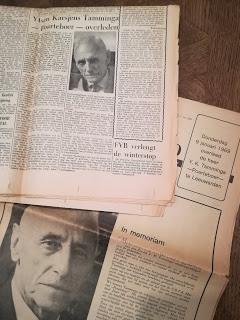[From Dutch]
With that thought, I remember the over-enthusiastic reaction of my African roommate's daughter (from a previous room tenant) when I mentioned that I personally knew someone who was born in 1886. The wife and children of my tenant, daughters of 10 and 8 years old and twin sons of 3 years old, came from London to stay with their father in Houten for a week. The father did not yet have the papers to move to London. The eldest daughter loved to tell and make up stories, her younger sister was the actress who faithfully and meticulously followed all the directions of her big sister. The parents and I were the audience. All week I enjoyed free theater performances in my living room and sunny garden, in some I played a part myself.
She was completely absorbed in her story telling. She listened mesmerized when I told her that I personally remembered her hero Martin Luther King, that he was my hero too, and how sad I was when he was murdered in 1968. What? Was I already alive when Martin Luther King was still around !?
Story & history suddenly came very close to each other for her. I was able to show her the newspaper with the news of King's death. I keep news articles of special events in a drawer in my living room. She began to think about the aspect of time and she pretty much jumped to the ceiling when I mentioned that my grandfather - that other personal hero, the one whom I am named after - was born in 1886. What!? In the 19th century? And you knew him !?
Yes, I knew him, I sat on his knee as a toddler, stayed with pake en beppe (the Frisian words for grandfather and grandmother) at the Spanjaardslaan in Leeuwarden and at the age of twelve I earned the nice amount of 1.25 Dutch guilders by weeding their garden. I was sad and also astonished when Pake passed away, how common it turned out to be for someone aged 82 to die - when in fact I thought the world should stop spinning. It was my first funeral, the grandchildren walking directly behind the bier from the Phoenix Church to the Northern Cemetry at Schapendijkje 4. That address where I already know so many people now. It was only after this crowd of grandchildren that the widow and their own grown-up children followed, as Pake had instructed. He was buried in the grave of his first wife, my mother's mother, Beppe Jikke, who died in 1938. That grave of Ytzen with his two wives is still there.
My mother was just 13 when her mother died at the age of 51, I was 13 when my grandfather died. When I ever have the feeling that I had a vehement puberty, I think of my mother: in 1937 an airport was built on their farmland (which had an immense impact on their way of life), in 1938 the farmer’s wife died, in 1939 the farm became military terrain due to the mobilization, in 1940 it was already conquered on the second day of the war and - even before the capitulation - 70 German soldiers were billeted with them. After that, the farmland was regularly bombed by the Allies, in November 1940 the family was evacuated and they went to live in the city, in 1942 my grandfather remarried and the two families were merged to live together in their civic house on the Harlingerstraatweg. In June 1943 the farm was bombed. "Today Groot Humalda has succumbed to great pressure", pake wrote in disguise to one of his sons who lived outside Friesland. How intense can your puberty be?
| Groot Humalda on a painting that I inherited from my aunt Dirkje. |
From 1934 to 1968, with a break during the war, pake wrote a weekly column in an agricultural magazine. He was known by the pseudonym Poarteboer (Gatefarmer): a farmer with a view of the countryside as well as the city, a wise man in the gate. His death was front-page news in the Frisian press. On his 100th birthday I published an article about him in the Friesch Dagblad (*). The following year, beppe Jikke's 100th birthday (March 24, 1887 - December 21, 1938) passed in silence. It elicited my muoike (aunt) Dirkje, who visited us around that time, to comment: you wrote about your grandfather last year, but you don't write anything about his wife, women are apparently not important. Suddenly I saw in my conservative aunt a militant feminist. The cynical comment came from deep in her heart, and I cherish that moment as a monument to my grandmother. My life partly comes from her, but unfortunately I never knew her. Last December it was 80 years ago that my beppe Jikke passed away. That someone could be dead for so long.
(*) See: http://blog.stylo.nl/2013/09/poarteboer.html


Geen opmerkingen:
Een reactie posten